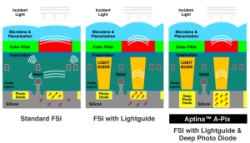May 20 2010
Enhancements in the Aptina A-Pix frontside illumination (FSI) image sensor technology, a third generation technology, has resulted in substantial improvements in crosstalk and quantum efficiency (QE) along with a 25% light level enhancement with the same signal-to-noise ratio based performance as compared to the second generation technology.
 Aptina FSI with Lightguide and Deep photo diode
Aptina FSI with Lightguide and Deep photo diode
Aptina, a leading innovator in the field of CMOS imaging technology with a focus on achieving the best pixel performance, will also offer the backside illumination (BSI) based image sensor technology during the second half of 2010 for meeting the requirements of applications that need pixels values of 1.1-micron and below. These enhancements to the A-Pix image sensing technology of Aptina and the BSI image sensor systems strategy has placed Aptina in a leading position in the market.
The FSI, a primary technology utilized by current image sensors, offers an attractive cost value and performance proposition and has triggered the widespread usage of cameras in digital video, cell phones, still cameras, notebook computers and many other applications. FSI is ideal for applications requiring larger pixels where overall imaging and low light performance is crucial, such as HD videos. For such high-quality HD videos, the 1.75 and 1.4 micron FSI pixels are likely to possess a long life.
The BSI technology, still in its early development phase is being used in consumer cameras at the higher end, where the manufacturer is less concerned with the high premium sensor cost. Since 1.1 micron sensors are required for future applications, the demand for the BSI is likely to be higher as the desired performance level may not be achievable through FSI.
The third generation Aptina A-Pix, a range of enhanced pixel technologies, incorporates 65 nanometer based pixel design rules that improve the pixel performance cost-effectively along with a larger lightguide and deep photodiode technology. By minimizing cross talk and increasing quantum efficiency, it is able to capture sharper images having vibrant colors even under conditions of low light and surpasses the conventional sensors in performance. Millions of imaging products incorporating the previous generations of the established and dependable FSI technology has been shipped by Aptina already.
A-Pix empowers cell phone cameras to capture high quality images, thereby competing against digital still cameras and facilitating emergence of a hybrid camera that integrates enhanced high-performance HD video and the digital still image capture features. These additions to the Aptina range vary from a 3MP type of sensor for use in mainstream mobile handsets to a 14MP high performance device that is targeted at high end cell phone handsets and DVC.
Aptina’s Vice President for Imaging Technology, Gennadiy Agranov informed that Aptina has made its commitment to be the preferred partner for creating and offering unique imaging systems cost effectively and speedily for meeting customers requirements. He added that there is a conflict in market needs between the increasing expectations for enhanced video and image performance and the move to smaller pixels based high resolution cameras. Due to such reasons, Aptina aims to continue on improving the FSI image sensor technology while at the same time launching BSI technology for applications requiring the smallest pixels.